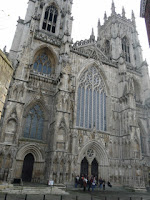
You know what it is like when you are waiting for something good, something nice, something that will just really hit the spot. And then that thing gets delayed. And then delayed some more. And then some more. And yet, you don’t stop anticipating what it will be like when it finally arrives. You still look forward to it, knowing how good it is going to be.
We had two things like that over here in Oxford. One was that our shipment of 15 boxes would arrive.
Eight large boxes full of items that we thought would really help us manage daily life better over here—linen, baby clothes for Tiny, adult clothes for us, some kitchen gadgets like a bread maker, special pizza tray, and mixmaster. Our dvds—quite a number of hours of viewing for a couple without a TV. Some board games like Settlers of Catan and its expansions, Tigris and Euphrates, the epic War of the Ring (yes, if you have a spare entire day, you too can recreate the entire Lord of the Rings trilogy of books as a boardgame), Bohnanza, and even The Game of Thrones (which we’ve never had a chance to play so far). We like our games, you might have spotted.
Seven book boxes full of…well books. These are divided between two groups. The first is the books that would really help our studies along—essentially work tools. These are books on John’s Gospel, some systematic theologies and treatments of the doctrine of the Trinity, a good chunk of patristics, and the like. The other group contains books that we need for our sanity.

(This is the other side of the York Minster from where the other pictures were shot. The York Minster includes some quite stunning gardens and multiple large old buildings around the outskirts of the gardens. They're impressive, but a minnow to a whale compared to the Cathedral.)
This is one of those things that non-readers probably just don’t ‘get’. For many people reading is like housework. It needs to be done. It probably even has to happen fairly frequently. But it is a chore. Something you do because you need to, and you move through it as expeditiously as possible. Statements that books are needed, let alone for mental health, seems a bit bizarre.
But for some of us, and Jen and I definitely fall into this group, it really is the case that we need to read. And we need to read things just for the pleasure of the reading, or because we have an interest in the area. Documentaries, radio, conversation, don’t really work. Even newspapers and magazines don’t quite have the requisite effect. There is something about the sustained storytelling of a novel, or the sustained exposition of a work of non-fiction that keeps the mind and the sense of being open to the world ticking along. Sooner or later (and usually sooner) we need to read.
And so the other set of books are enjoyment books. Novels that we’ll really want to read again in the next four years. Books of history, theology, and cultural analysis that are on our ‘read sometime in the next four years’ programme. Books of poetry that are on Jen’s ‘read regularly’ list to sustain the soul. You get the picture.
The nice thing about the last ten weeks is that we’ve coped so well with little more than two suitcases, a fully furnished flat, and purchasing a fair amount of kitchen stuff. By the standards of typical Western materialism we’ve been almost camping! In fact, it showed that it is possible to function with a lot less stuff.

(What's left of a tower as part of an old fortification. Looks far more impressive at this distance than close up. The neat part of the defensive strategy were a series of signs right around the mound saying 'keep off the grass'. As long as you had a critical threshold of literate invaders, this tower should have been impregnable.)
However, it’s also shown that certain of the gadgets that clutter one’s life can make a huge difference. We’ve noticed the absence of many of the things in the boxes many times over the last ten weeks.
So, we’ve been looking forward to these boxes arriving. A lot.
So guess which day they came?
That’s right, and they arrived about five hours after we got into bed.
Baddeley’s don’t really function well on either:
a) low sleep
b) radically changed sleep
Both of those together are synergistic. Just not in a good way.
(Before we get inundated with messages about sleep and small babies...Relax. We're aware of the issue. But it doesn't seem like there's a cure, it's just something we'll have to persevere through.)
Anyhow, you know how you look forward to something and look forward to it and look forward to it, and then it comes at precisely the wrong moment. You can neither savour the moment, nor do you quite have the resources to cope with the extra load it places upon you.
That was Monday. The boxes came, and the rejoicing was a fairly tepid ‘I suppose this is good;’ ‘Yep, been waiting for this for a while now.’
 (Part of the cemetery connected to a small church buried away in the centre of a town block. It didn't face onto any street at all, you had to walk down one of two lanes to get to it, and the lanes only existed to get you to the church. Why you had such a church right on the doorstep of the cathedral, and several other churches in easy walking distance is beyond me. But it was active up until the early nineteenth century.)
(Part of the cemetery connected to a small church buried away in the centre of a town block. It didn't face onto any street at all, you had to walk down one of two lanes to get to it, and the lanes only existed to get you to the church. Why you had such a church right on the doorstep of the cathedral, and several other churches in easy walking distance is beyond me. But it was active up until the early nineteenth century.)Receiving the boxes required a bit of work. The delivery company would charge us extra to take them to our flat (and even more to use the lift…). So I did it. This involved a minor logistical exercise that I’m proud to say I worked out the first day I faced it.
There are 8 boxes.

And 7 book boxes.

There is one lift.

It’s fairly small.

and it takes a little while to move several floors. So it is the rate limiting step.
So the way to tackle the move is to get all the boxes from outside the block to the lift. Then move the 8 boxes into the lift, go up with them, and unpack them out of the lift onto our floor. Head back downstairs and repeat the process. Then move the fifteen boxes into our flat. This way I have the minimum number of journeys in the lift. This may seem like a small thing, but you’d be surprised how many people need to be faced with the problem a couple of times before they twig to it.
So the boxes came in, and my body was not a happy camper. My brain was occasionally shorting out and coming back on line. (Seriously, there’d be times I’d just sit there and have to wait before my brain seemed to want to get moving again). This was OK for the box moving bit of Monday.
 (This is the part of the York Minster that seemed to get used most often to do actual church stuff. On the other side of the raised platform there were multiple rows of chairs laid out.)
(This is the part of the York Minster that seemed to get used most often to do actual church stuff. On the other side of the raised platform there were multiple rows of chairs laid out.)However, there was another task that Monday required of yours truly.
It was the other thing that had been anticipated. Remember I’m over here to do some doctoral work on a guy called Athanasius? All through this term I’ve been working on everyone other than Athanasius (not quite, but it seemed like it). Writing a two thousand word essay each week for a discussion with my tutor. It’s been great. But I have been waiting for the chance to write one on Athanasius. To get stuck in to him, use some of my previous thinking and reading, and produce something I could be pleased with. So guess what day that had to be written?
That’s right. Monday.
I got to write my long anticipated essay while my brain periodically went off-line every so often.
 (An arrow slit in the defensive walls that go right around a fair sized chunk of the modern city of York. Not that the walls are modern, just that the city is now bigger than them. Just so that we're clear on that point.)
(An arrow slit in the defensive walls that go right around a fair sized chunk of the modern city of York. Not that the walls are modern, just that the city is now bigger than them. Just so that we're clear on that point.)This was the Monday that not only was tough going, it took the enjoyment out of two of the things we’d really been looking forward to.
Bad Monday.
MDB



































